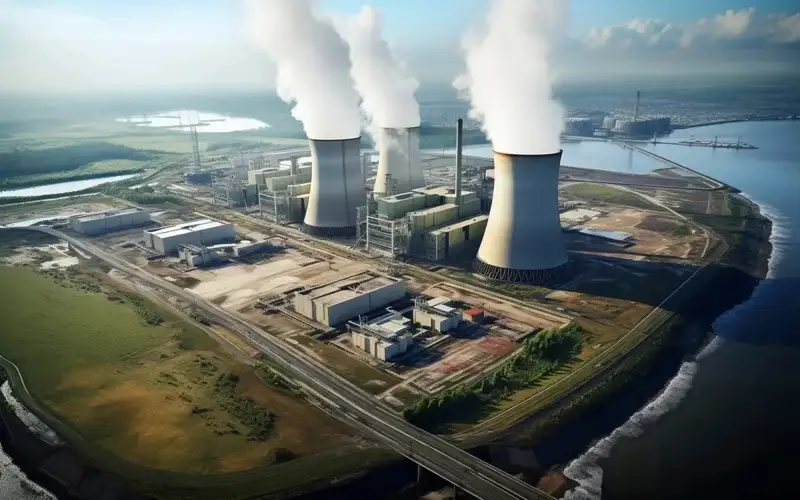Foreign media on Kazakhstan: What will the construction of a nuclear power plant bring to Kazakhstan? Kazakhstan and China collaborate to build moon base
Following the recent news such as Kazakhstan’s plans to build a nuclear power plant, its collaboration with China on a lunar base, and a Thai company’s investment in a fish-processing plant, Kazinform News Agency presents a weekly review of international media coverage on Kazakhstan.

China Daily: What will the construction of a nuclear power plant bring to Kazakhstan? Expert opinion from France
According to China Daily, Kazakhstan is actively considering the construction of a nuclear power plant (NPP) as part of its strategy to meet growing energy demands and transition towards clean energy. This project could significantly enhance Kazakhstan’s energy security, establish it as a leader in the nuclear industry in Central Asia, and attract advanced technologies and investments, contributing to the country’s sustainable economic development.
However, the initiative also brings up concerns about safety, environmental impact, and the need for public support. Given Kazakhstan’s strategic position in Central Asia and its substantial uranium reserves, the country is well-placed to play a key role in regional nuclear energy development. Cooperation with neighboring countries and international partners will be crucial in this effort.
“Decision-making in this area is largely dependent on neighboring countries and international partners. Kazakhstan actively cooperates with Russia, China, and other countries in the field of nuclear energy, which opens up opportunities for creating effective regional energy systems. Such cooperation also helps Kazakhstan strengthen its energy independence and ensure stability in the region,” said Edgar Siberger, an expert in the nuclear industry from the international company Assystem.
To ensure success, Kazakhstan must engage in transparent international collaboration, establish clear legal frameworks, and effectively communicate with the public. By doing so, the country can attract foreign investments and expertise, ensuring the NPP project meets high safety standards and garners broad support. Additionally, Kazakhstan has the potential to not only supply uranium but also lead in the development of small modular reactors (SMRs) and nuclear waste recycling technologies, further advancing its position in the global nuclear industry.
Public support plays a crucial role in the success of any nuclear project. In France, where nuclear energy is the main source of electricity, regulators place great emphasis on communication with the public. The main mechanisms include transparent information about safety, environmental aspects, and the benefits of nuclear energy.
“Public hearings, meetings with local communities, and educational programs are regularly held. It is important to ensure that people have the opportunity to ask questions and receive answers, which builds trust and reduces concerns. Kazakhstan should pay attention to these practices and adapt them to its conditions to ensure broad support for its nuclear initiatives,” concludes Siberger.
EU Reporter: Kazakhstan and China collaborate to build moon base: A new era in space exploration
EU Reporter reports that a groundbreaking development, which could reshape the future of space exploration, has been announced - a joint venture between Kazakhstan and China to establish a lunar base. This partnership marks a significant step forward in the global space race, reflecting both countries’ ambitions to be at the forefront of space exploration and technological innovation. The collaboration also underscores the growing influence of non-Western powers in the domain of space, historically dominated by the United States and Russia.
The idea of a lunar base has long fascinated scientists and space enthusiasts, offering a potential gateway for deeper space exploration, scientific research, resource extraction, and even tourism. For Kazakhstan and China, this joint venture is about more than exploration—it's a chance to showcase their technological strength and geopolitical influence. As China advances its space ambitions, Kazakhstan aims to leverage its strategic location and growing expertise to become a significant player in the global space arena.
Kazakhstan has a longstanding role in the space industry, hosting the Baikonur Cosmodrome, the world’s first and largest space launch facility. In recent years, the country has sought to expand its space capabilities beyond Baikonur, investing in space research, satellite development, and aerospace education through its space agency, KazCosmos. The partnership with China marks a significant step forward, allowing Kazakhstan to access advanced technologies and participate in a project of global significance.
China, meanwhile, has rapidly advanced its space program, achieving milestones like the Chang’e lunar missions and landing a spacecraft on the Moon’s far side. China’s interest in establishing a lunar base is driven by strategic and economic goals, including deep-space missions and resource extraction.
The joint Kazakhstan-China lunar base project is ambitious, involving complex challenges such as developing life support systems and dealing with the Moon’s harsh environment. The collaboration could also attract other international partners, potentially reshaping global space exploration dynamics.
This project highlights a shift in space power dynamics, with new players like Kazakhstan and China challenging traditional leaders. It also underscores the need for international frameworks to manage space activities, particularly regarding resource extraction and environmental protection. The Kazakhstan-China lunar base could pave the way for a new era of space exploration, with the world watching closely as they embark on this historic venture.
The Times of Central Asia: Kazakhstan and Türkiye to Increase Agricultural Trade
The Times of Central Asia reports that during Kazakh Minister of Agriculture Aidarbek Saparov’s visit to Türkiye on August 12, agreements were signed for $2 billion in Turkish investments in Kazakhstan’s agro-industrial sector and agricultural trade.
Six projects have already been implemented in Kazakhstan with participation of Turkish investors. The imminent launch of a further ten projects totaling $553 million, include the construction of greenhouse complexes, plants for deep processing of wheat and beans, and vegetable storage facilities.
Armada Gıda, one of Türkiye’s leading companies in producing and exporting agricultural products, is to increase the import of lentils from Kazakhstan, while Tiryaki Holding, is to import of 250 thousand tons of Kazakh wheat.
According to Minister Saparov, in 2023, the volume of Kazakh-Turkish trade in agricultural products increased by 13%.
Kazakhstan has long exported crop products to Türkiye and following the abolishment of restrictions in June, Kazakh agricultural producers can now begin exporting livestock products.
Minister Saparov stated that Kazakhstan expects a good crop harvest this year and is ready to increase the export of high-quality agricultural products to Türkiye.
The Times of Central Asia: Thai Company to Build Fish-Processing Plant in Kazakhstan
The Times of Central Asia reports that the Thai company Sea Value Plc. plans to build a plant in Kazakhstan to produce canned, processed fish, and frozen semi-finished products. The project was discussed during a meeting on August 14 in Astana between the Chairman of the Investment Committee of the Ministry of Foreign Affairs of Kazakhstan, Gabidulla Ospankulov, and the President of Sea Value, Dr. Poj Aramwattananont.
As reported by the company Kazakh Invest, Sea Value is currently searching for a plot of land to start the project.
Local fisheries are planned to supply fish for the new production, and the finished products will be exported to Thailand and other countries.
The Thai company plans to invest $6 million in the construction of the plant, which will produce 3-5 tons of fish products per day.
Sea Value is Thailand’s second-largest producer of canned tuna, exporting products to 150 countries.
In 2023, trade turnover between Kazakhstan and Thailand increased by almost 36%, reaching $367 million.
